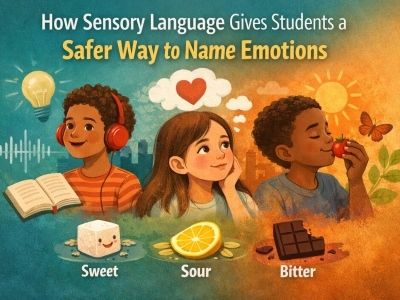Key Strategies for Empowering Long-Term English Learners
Topics

Together, educators are doing the reimagining and reinvention work necessary to make true educational equity possible. Student-centered learning advances equity when it values social and emotional growth alongside academic achievement, takes a cultural lens on strengths and competencies, and equips students with the power and skills to address injustice in their schools and communities.
Long-term English learners (LTELs), with their strong social English and gaps in advanced academic language, are often given too much or too little support. Here are some strategies for better serving LTELs.
In recent years, educators across the country have been asking a pressing question: “How can we support our newcomer Multilingual Learner (MLL) students?” Many communities have seen a large increase of K-12 students recently arriving to the United States with little to no English, and instructors and school leaders are working on overdrive to help them feel welcome and empowered to learn a new language. This is vitally important work and certainly deserves our attention. However, there is an even larger group of MLL students that a significantly fewer number of teachers and administrators are asking about. The students in this group carry enormous potential, but continue to be largely misunderstood and left behind; they are Long Term English Learners (LTELs).
Many of these LTEL students were born in the U.S. or arrived at a young age; when I was a high school MLL teacher, they made up a majority of my co-taught English classes. Many had developed strong social English and could chat with me about any topic of interest, but were lacking in more specific academic English skills, such as writing clear, complete paragraphs or making complex inferences when reading text. As a result, they were often given too much or too little support in the classroom that did not fit their unique needs.
The Unique Language Needs of LTELs
When they were placed in a reading intervention class or in an English Language Development (ELD) class (with more recently arrived MLL students still learning to master social English), LTELs often found the material too basic and quickly lost motivation. I often heard them say, “I already speak English, so why am I in this class? I don’t need it.” However, the opposite is true in many general education classes; since the students do speak English and have foundational academic skills, many teachers assumed that they did not need any extra help and did not offer it to them, often saying, “Those students speak good English. They’re doing fine.”
As their MLL teacher, I was aware of their gaps and did what I could to support them in class, but I would usually end up dedicating a majority of my time to students who did not have the English language skills to work independently. Being pulled by so many competing needs, I often felt guilty when I was unable to focus on addressing the language needs of my LTEL students. I frequently asked myself,, “How can I better support my LTEL students when I’m already stretched so thinly?” This is the question this article will aim to answer.
When I later took on an administrative role in a new district and was tasked with researching this issue, I learned that I was one of thousands of educators asking this question and coming up short on solid answers. The research that does exist has mainly been conducted in the last 15 years and focuses on identifying common traits and challenges these students face; there is not yet a tried and true approach to addressing them. What is clear, however, is that LTELs need specialized, targeted consideration and support for their unique linguistic needs; it’s time to break from our traditional, ineffective approaches and adapt innovative strategies to help these students thrive.
Common Characteristics of Long-Term English Learners
In order to better serve these students, one must understand both the technical definition and the common characteristics of LTEL students. The definition provided to us from Turning the Tides of Exclusion: A Guide for Educators and Advocates for Immigrant Students mirrors what most districts use: “English Learners who have been in United States schools 7+ years, are orally fluent in English but reading and writing below grade level, and have low literacy in the home language, if any” (Olsen, L. and Jaramillo, A., 1999). It is important to note that the amount of years a student remains in the program to be classified as an LTEL can vary by state, but most tend to fall between the five and seven year period. While our LTEL students each have a rich and unique background to discover, there are some commonalities that educators should be mindful of when interacting with them and their families:
- Many LTELs were screened and entered into MLL programs almost as soon as they started school, typically in kindergarten or first grade.
- LTELs may have limited support with academics and college readiness at home.
- Parents want children to succeed, but many are not familiar or comfortable with the U.S. school system.
- Some have additional responsibilities outside of school, such as a job or caring for younger siblings.
- They have indirectly learned to stay passive and under the radar in class and tend to complete just enough work to earn passing/average grades.
- They have social language skills ranging from strong to fluent and are able to easily communicate with teachers and peers about ideas and topics of interest to them, but they tend to struggle with the academic language needed to excel in school.
- LTELs often show little to moderate motivation to extend themselves beyond basic requirements of school. Some could be classified as “underachievers.” This could stem from one or more of the factors mentioned above, such as feeling overwhelmed by out-of-school responsibilities or not being informed of the additional classes, credits, or extracurricular activities needed to get into college.
Each item above is an intricate and complex part of a student’s identity and can have deeper effects than we realize. Although most LTELs look, speak, and act in ways that read as “American” on the surface, their familial histories give them multifaceted perspectives on school, their communities, and society as a whole. They are determining their place between two or more competing cultures, which, for many, involves finding a personal balance that fits them best.
As we build relationships with these students throughout the year, giving them opportunities to share parts of their heritage and taking an interest in their experiences creates a positive and affirming bond with them. For example, I would make an effort to try a food or to listen to music that my students recommended, and I would discuss my experience and what I learned with them after experiencing it. Their faces would light up when they could see that I enjoyed something they had shared with me; they could see and feel that I valued them as more than just students, but as unique people with rich backgrounds. Building stronger personal relationships with these students led to a higher likelihood of success when I implemented academic strategies with them.
Connecting with LTEL Families
Just as it is important to learn who students are underneath the surface, it is equally important to try to understand who their caregivers are and what they are going through at home. Parents and guardians of MLL students can be notoriously difficult to contact and connect with, which tends to frustrate even the most caring educators; after so many unreturned messages home and sparsely attended back to school and teacher conference events, it can be easy to assume that many of them are not trying or do not value their children' s schooling. In fact, the opposite is usually true; many guardians take their children's education very seriously and communicate to them that school should be their top priority. However, it can be difficult for many parents and caregivers to engage with teachers and other school staff as frequently and deeply as they would like.
In multiple instances when I made contact with parents of LTEL students who had been frequently absent and fallen behind, they told me that they were extremely worried about their children and had been encouraging them to go to school. Between working multiple jobs and caring for younger siblings, they were not physically able to be present at home and had to assume their child went to school unless we called and told them otherwise. They told me that they had tried everything, but their child would not listen, and that they didn’t know what else to do to help them. I could feel their emotional pain and exhaustion in their messages, and it was truly heart-wrenching to imagine what they were going through. I would always do my best to connect them to the school’s counselors, social workers, and other available personnel and resources, including parenting classes offered by the district.
Sometimes, the most impactful action I could take was to tell a parent that I could see how much they cared about their child and that they were doing a great job parenting, even if they didn’t feel that they were. These connections gave the parents hope that someone at the school was there for them and for their child, and they ended up reaching out more often as the year progressed. Through these interactions, I learned one of the most important strategies for engaging with LTEL students and their families; no matter what, always reach out with the assumption that parents are trying their best to support their children and want them to succeed as much as you do.
How to Help LTELs with Advanced Academic Language Development
Although research-based, sure-fire solutions to best serving LTELs are still being developed, teachers can still actively and effectively support LTEL students in their classrooms. Even though they are not as likely to ask for help or to stand out as high-need, many still struggle with advanced academic language and would thrive with targeted support. In many schools, this support is mainly given to new or struggling English learners who are visibly behind their peers. Oftentimes, LTEL support is more focused in helping students complete specific assigned tasks and not on addressing their learning gaps. Creating and including them in skill-based small groups that address specific skills (reading and writing strategies, vocabulary development, oral discourse, etc.) helps to build their engagement in learning and directly build their ability to utilize language academically. This will allow students to more easily access content across the curriculum.
No matter what class they are in, individualized instruction and attention from a mindful and caring teacher will greatly increase LTEL students’ odds of success. When we treat them and their families as unique individuals with unique strengths and needs, we can help them truly unlock their potential and empower them to achieve their goals and dreams.
Photo at top courtesy of NGLC.




